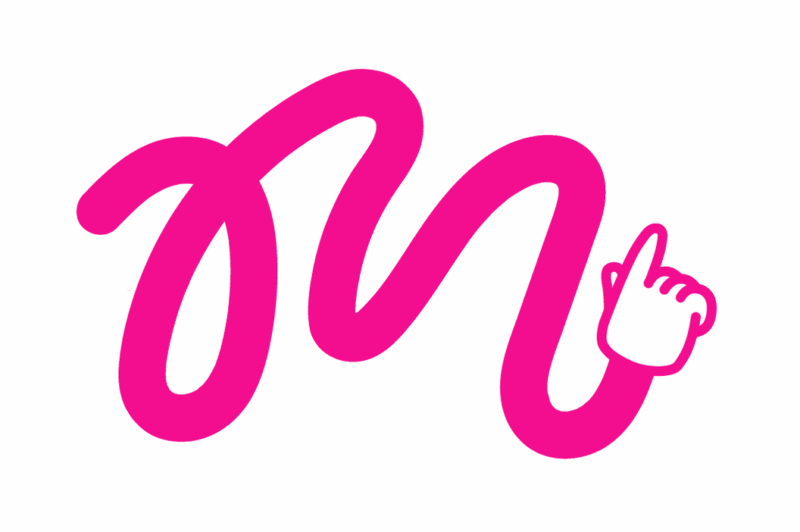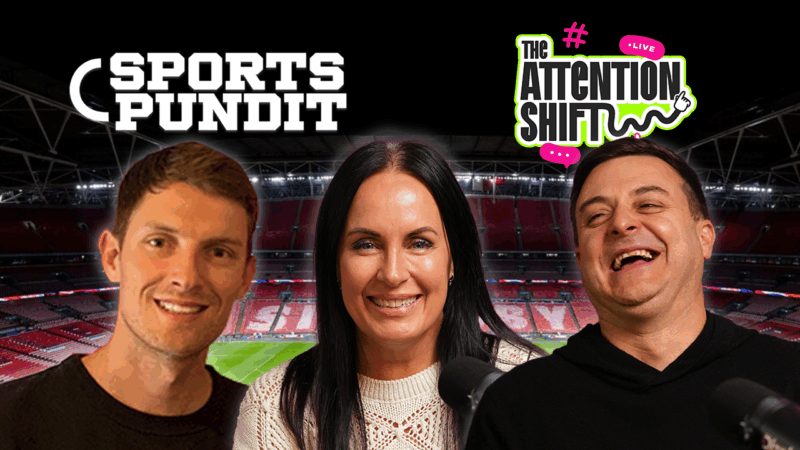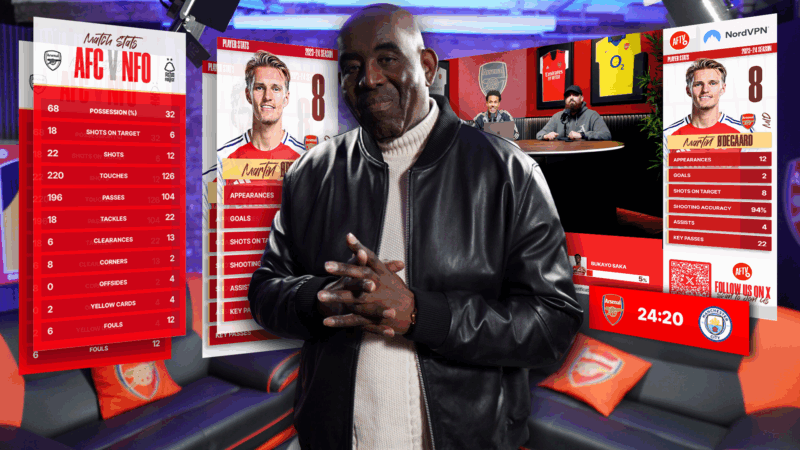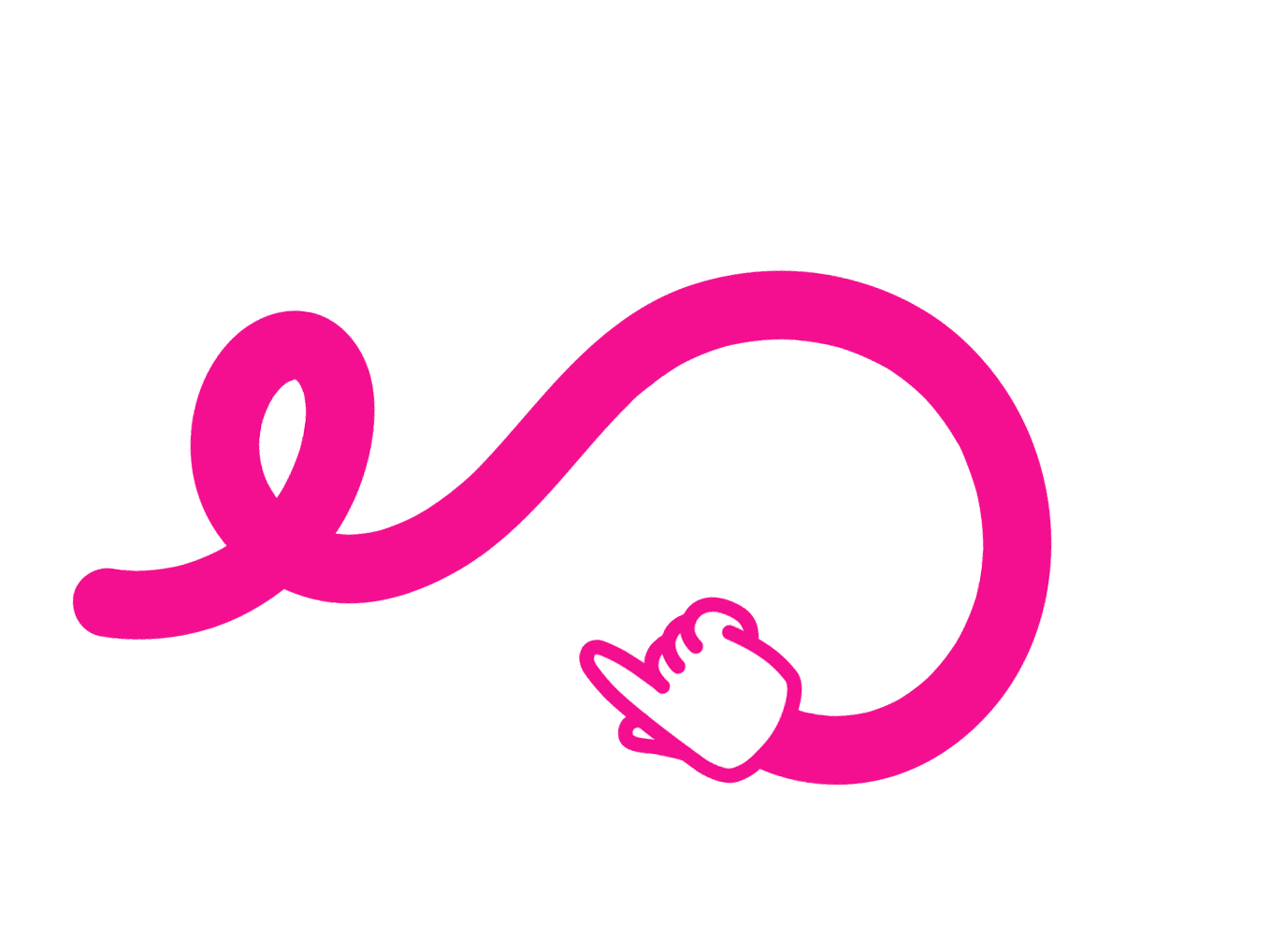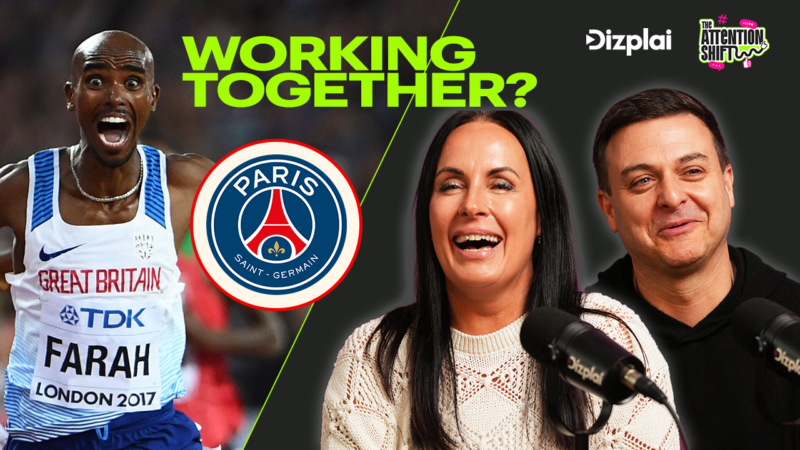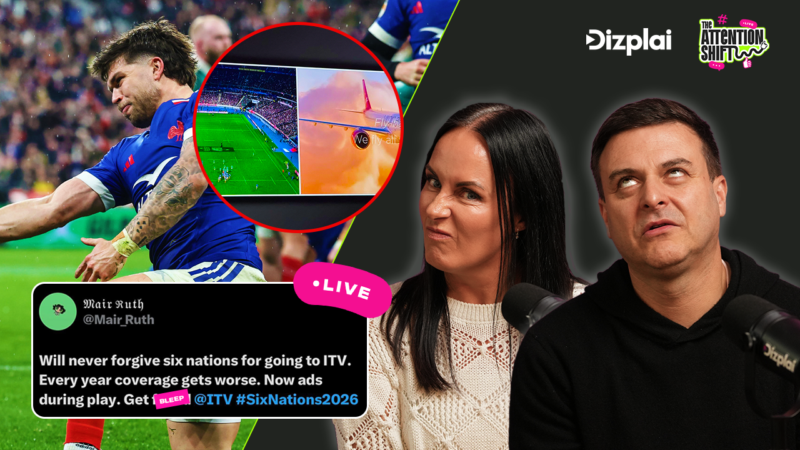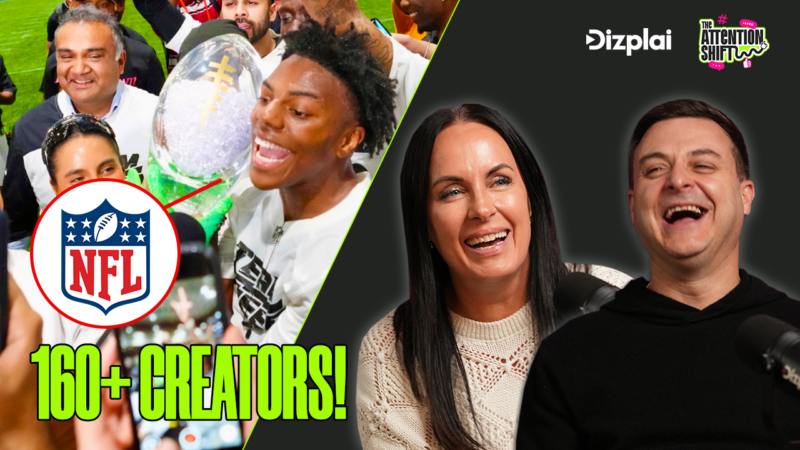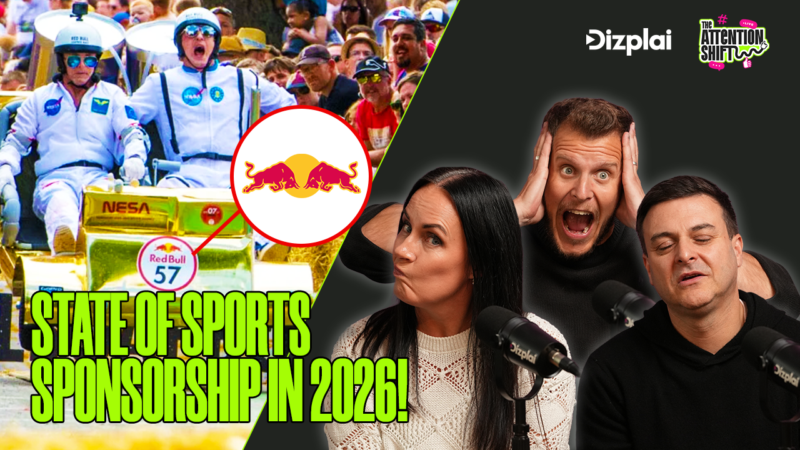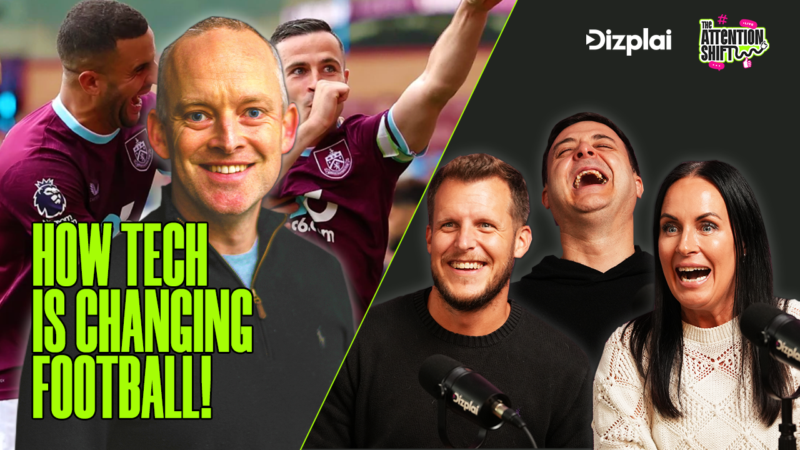
Summary
- Exclusive insights and interviews from the execs shaping the sports business landscape.
- How are younger leaders are forcing organizations to rethink fan engagement, distribution, and the entire attention economy playbook?
- Why sports properties can no longer treat fans as a monolith—first-party data and interactive media are essential to understanding fragmented behavior across 12+ daily touchpoints.
- What rights holders can learn from Guinness, IKEA, and BMW: looking outside sport isn’t optional anymore if you want to build real loyalty and stay ahead of the innovation curve.
- The R&A’s Roblox-to-Topgolf pipeline proved digital experiences drive real-world participation—a data point that rewrites every assumption about gaming’s relationship with sports engagement.
Transcription
[00:00:03] Jo Redfern: Hello and welcome along to a very special edition of The Sports Pundit Meets the Attention Shift podcast. And I’m in the, uh, driving seat today. The power, uh, we’re fresh off the back of speakers only, which is, uh, sports pundits. Annual gathering. Now, I think we can call it an annual gathering, don’t you?
[00:00:23] Jo Redfern: Uh, Andy. And so, uh, we are gonna take a look back on what has been a really interesting, uh, busy couple of days. I’m, I’m sure Andy is ready for the weekend and to put his feet up. But I’m gonna come to you first. Andy. Addition, two of speakers only brought to you by sports pundits. Uh, tell us just a little bit, go back, give us, give us a little bit about the history and why you pulled this thing together and how’s it been different.
[00:00:50] Andy Marston: Yeah, sure. Um, first off, uh, thank you Joe for being part of yesterday and also to Ed for his support across the two days, uh, and, and the whole display team, um, alongside the other part. Uh, in terms of, uh, speakers only the concept came from attending, uh, various other events around the sports industry and feeling like there was a way to create something more interactive.
[00:01:18] Andy Marston: Um, I really love, uh, the idea of sports pundit being kind of a bridge, I guess, between generations. Uh, and I feel like because of where. I am from an age perspective, I can kind of both talk to the younger generation and to the more senior leadership. Um, and so yeah, trying to like facilitate, I guess that kind of like cross pollination of ideas between, between both like the younger execs, um, and also those more senior execs, um, was kind of the main objective.
[00:01:54] Andy Marston: And then. In terms of pulling it together. I guess the, the other part to it was like sports pundit already hosts social events, uh, fairly regularly in London and in in a few other cities. Uh, we’ve done a few in Manchester and hopefully we’ll do more, um, but. The idea here was like, if we’re gonna do something that’s gonna be content focused, like what?
[00:02:14] Andy Marston: What I quite often say when I go to a conferences, like a lot of the content you could consume via a podcast or a newsletter. Mm. So if you’re gonna be there and you’re gonna be live and you’re gonna be in the room with people, how do you create something that can only be done because of the people in the room?
[00:02:30] Andy Marston: So kind of that additional. Interaction was quite important. I didn’t want it to be monologues from the front and everyone else just sitting back and listening because there’s nothing worse than going to an event and you’re sat next to someone you really wanna talk to, and you don’t get the chance because you guys won’t stop talking.
[00:02:46] Andy Marston: Um,
[00:02:47] Jo Redfern: Normally I do that and then get shushed by the person in front of me.
[00:02:51] Andy Marston: exactly.
[00:02:52] Jo Redfern: So it would say not to, not to feel like I was gonna get shushed this time.
[00:02:56] Andy Marston: Yeah. And then I guess, uh, hopefully I’ve done an okay job there of explaining the, the concept. Um. Speakers only kind of speaks for itself in terms of the name. The idea is that there’s 50 attendees. Um, each one is on a panel. There’s 10 panels of five, so every person speaks at some point, and that therefore kind of levels the playing field in terms of like, no one’s better than anyone else In terms of like, you know, quite often there’s almost that seg segregation, I guess, between the speakers and the guys that have, uh, paid to attend.
[00:03:28] Andy Marston: Um, the fact that no one’s paid and the fact that, uh. Everyone is a speaker, kind of levels the playing field in that regard and allows me to be kind of like the curator, I guess, of like exactly who’s in the room and who gets to, who gets to be, uh, interacting with who. Yeah.
[00:03:44] Jo Redfern: Are you, um, ed, ed, were you there last time or was this time your first time?
[00:03:49] Ed Abis: This was the first time for me this year.
[00:03:51] Jo Redfern: Okay, so I’m gonna come to you then because I have had the pleasure of, of attending both editions of speakers only, and that is one of the things that really comes across to me is it feels demo, very democratic in terms of everybody’s voice and opinion is valid.
[00:04:06] Jo Redfern: It’s, you know, what you, what stay, what set in the room stays in the room. So you can be quite candid and quite open, but that, that changes the whole vibe. Did you pick up on that at all?
[00:04:16] Ed Abis: Totally. Yeah. I mean, look, there were, there were. Some very senior people in the room and some middle seniority and some people starting, not starting out in their careers, but they’re very much work stages. But it didn’t feel like there was any hierarchy. Mm. It felt like when you, in those group discussions that that everyone’s voice could be heard.
[00:04:34] Ed Abis: Now look, naturally, some people, look, I’m gonna talk loads. Right? That’s just me. Naturally. Some people are gonna talk more than others, but I felt like people were really trying to bring people into the discussion if they weren’t. Um, talk because you understood where they were from the roles they were doing, and I think everyone was making an effort to try and get them involved in the discussion.
[00:04:53] Ed Abis: Yeah. Yep. What the reality is, is like as a, as an older leader, right? I do see it as my job to try and help the younger leaders to, well, they’re all gonna make mistakes, right? And mistakes is part of learning, but hopefully make a few less mistakes than I’ve made in my career.
[00:05:07] Jo Redfern: It’s, it’s about what I really like is that knowledge transfer. Because with the best will in the world, ed, you and I, if Andy’s talking about a bridge, we’re over the other side of the bridge. Andy’s somewhere in the middle and
[00:05:20] Ed Abis: I’m just making sure we get everybody across.
[00:05:22] Jo Redfern: Exactly. But it’s a nice, it’s a nice analogy because there is a knowledge transfer that goes on. I certainly found that in, in my group. I can see why you put me in Ed in different groups, by the way, or else they wouldn’t be able to get a word in anyway. But I could see that in, in my group, there was.
[00:05:38] Jo Redfern: There were times when I was talking about stuff and I mean, what was lovely is there was nodding and there was engagement and there was, there were like sponges, kind of the, the younger cohort amongst us. Um. But then equally, I’m absolutely fascinated by what they’ve gotta say. They’ve got a perspective that I don’t have and that knowledge transfer is really lovely.
[00:06:00] Jo Redfern: And what was great actually was this breakout format because again, there’s nothing worse than going to a conference. And your bum starts getting a little bit numb. ’cause you’ve been sat on your chair for two hours and you’ve been talked at, as Andy said, whereas there’s a nice fluidity to this. ’cause you’re getting up, you’re going into your breakout groups and then you come back and you sit down and you hear other perspectives.
[00:06:20] Jo Redfern: Mm-hmm. And was that, was that something that you planned consciously, Andy? Or is that something that just kind of evolved as you were thinking about this thing?
[00:06:27] Andy Marston: Yeah. Know exactly where I got the idea from. Um, but the idea for breakout groups was new this year. Last year it was slightly longer panels of 45 instead of 30 mm. This year it was 15 minutes of breakout discussion before the panel started, and then you went through into the breakout groups. And I tried to make it so that there was like one representative, I guess, of each breakout group on the panel, so that there was like ability for everyone to get their point across last year.
[00:06:58] Andy Marston: I was trying to point out people in the crowd to kind of bring them in. And I did that a little bit this year as well. But I felt like having that breakout group meant that everyone got to say that piece before mm-hmm. Went up on stage. And it also settled people’s nerves a little bit that were going up onto the panel because even if they were a bit stuck on ideas, they got to consult with 10 other people or whatever.
[00:07:17] Andy Marston: They went up. So they had their own ideas to bring to the table, but they could also then lean on the other people in their group and kind of share their ideas. If there was something that, um. Came up that was fresh. Mm-hmm. It was like a fresh idea for them. The only other thing to say is, uh, Joe, you’re in a very unique position, I think, other than yourself.
[00:07:36] Andy Marston: Uh, and, and I, I think Jamie k is the only other person that was there last year. Wow. Made the conscious effort that no one got invited back. And obviously yourself and Jamie were exceptions to that because you host the sports planet, media and marketing podcasts respectively. Um, but like that was also an a, a kind of.
[00:07:57] Andy Marston: An idea that I was really keen to stick to because I think it’s so easy to kind of insult people. If you invite half the group back and not the other half, everyone starts to question what they did wrong. Yeah. Um, and so I was really keen that like, in order to kind of like keep that, that rule in place, it allowed for, you know, 50 new, uh, people to enjoy the event.
[00:08:19] Andy Marston: Then there’ll be reunion events where last year’s attendees and this year’s attendees will now be able to kind of like congregate, almost like alumni network kind of vibe. Like class of 24 and class of 25 can now kind of get together and, and meet up kind of throughout the year at various events.
[00:08:35] Jo Redfern: You are, you are certainly focused on community, aren’t you? I mean, that’s something that comes up a lot. When we’re chatting, you know, something that you started with Sports Pundit with the newsletter. Now there’s podcasts, now these events, ed as someone who was there for the first time, but we talk about community a lot when we’re chatting.
[00:08:53] Jo Redfern: You know, how important is it in the sports industry? To build that community, particularly when you’ve got younger entrants into the industry, they might not necessarily walk into a job. There’s gonna be more that are consultants or I call it CEO, of me than perhaps when we started our careers. So how important is it to build community for those new and younger execs that are coming into sport in your view?
[00:09:17] Ed Abis: Yeah, I think massively important. Ryan, I think we, I chatted to a few of the, the younger leaders who were on panels and Yeah. And again, they felt like they could be really open for one. They were like, I’m, can I swear like I shitting myself to go and do this? I’m like, look,
[00:09:32] Jo Redfern: Isn’t it? Yeah. Gonna, conferences for younger people is often really scary and daunting.
[00:09:36] Ed Abis: and I said, I said, look, I used to be exactly the same when I started doing it. Mm-hmm. I mean, you just, you don’t become desensitized to it, but you learn how to manage your emotions. And I, and I said, look, my way of managing it is. I try and prepare as much as I can. The reality is, is most of what you prepare, you don’t actually use in the end.
[00:09:50] Ed Abis: But every time I don’t prepare, I fail. And you know, that old adage of, you know, fail to prepare, prepare to fail, like, yeah. And so I talked a little bit about that and I, and I also said, I said, look, I’ve just been sat in groups with you and heard you talking about your subject matter. You know your stuff.
[00:10:04] Ed Abis: If you, if you, if you feel uncomfortable, not sure. Mm-hmm. Then maybe try and stay in your lane where you are comfortable. And then as you start to build that confidence, then you can start to open up and get out of your lane a little bit. So. Like, I love being able to do that. And I’ve had, I’ve had some great leaders down the years when I was younger that have done that for me too.
[00:10:23] Ed Abis: And you look, you’re always trying to pay it forward. And I think that, I think what, what, what I like about what Andy’s done is he’s. None of it ever feels like it’s commercially motivated what he’s done with Sports Punt. And I know he doesn’t think like that at all. And look, things come off the back of that.
[00:10:38] Ed Abis: Mm-hmm. Well, he always feels like it is authentic and it is about the community and it’s community first. ’cause if the community doesn’t work, the whole movement doesn’t work. And yeah, I have gravitated more and more towards Andan Sports Public because of that. Because you do go these events and people do feel like they can talk openly.
[00:10:56] Jo Redfern: Isn’t it? Yeah, it, it, it really did. And I thought it felt more collegiate this time around perhaps than than last year. It just, you know, I really, really enjoyed, I was in a group with, um, uh, Michelle and Sean and remind me who was the, uh, lady who worked at Arsenal and Emma, Emma. And oh, it was fascinating speaking to them, just hearing about their, their viewpoints.
[00:11:23] Jo Redfern: I mean, we, we talk about the future of fandom in sport a lot. And I mean, it’s something that I looked at in my work with the Premier League on their future fan strategy earlier this year. But again, that’s something that came up. I know Lee Rad born when he was discussing what he thought, hi, some of his, uh, takeaways, um, talking about younger execs and how to get.
[00:11:46] Jo Redfern: Lead us to think about the future of the fan and, and that’s difficult to do if you’re a long term industry exec, right?
[00:11:52] Jo Redfern: Certainly what I thought was really interesting hearing from those younger execs is what their perception of the future fan is. And I know it’s something that Lee Rad Born talked about, in his talking head. So let’s hear a little bit from Lee now.
interviews 1
[00:12:04] Lee Radbourne: I think I’m most excited to discuss, where the future of the fan is going.
[00:12:09] Lee Radbourne: There’s lots of interesting talks around, how do you get more resonance and how do you reach fans? So yeah, especially with having younger audience here as well. People who are younger.
[00:12:21] James Haigh: Viewing habits are changing. I know that what appeals to them is not necessarily what appeals to my generation or or older generations. We gotta listen to them. We gotta do our research on them to actually be able to answer that question rather than copying and pasting the same stuff and just clicking it down to 30 seconds on TikTok.
[00:12:37] James Haigh: Like, what? Why aren’t we creating the right content that actually appeals to them? We need, we need to understand them.
[00:12:42] Lee Radbourne: I think, you know, we should always be learning from not just from the experienced people in the room, but also from them coming through. They’re the ones who are actually using these new platforms, engaging with these communities, and I think knowing where they are, how they want to engage and what’s important to them is actually insight that’s sometimes lost in the aby of this industry.
[00:12:59] Andy Marston: I guess in terms of that learning from, from younger execs, one of the points I guess of starting sports pundit when I did, I was, fresh out of uni working at an agency, small cog in a big machine. And when you’re doing that research and insights, you are, uh, you are working for some pretty big clients, but not necessarily in an external facing role.
[00:13:21] Andy Marston: So like you’re only really meeting the same like three or four people on a day-to-day basis that you’re working with. So part of it was like seeing all of the deals that were getting done happening because of relationships and not my research most of the time. Um, and, and just realizing that like, well actually, if you want to develop within the sports industry, a lot of it comes down to building that kind of like foundational relationship.
[00:13:46] Andy Marston: So. The newsletter was a way for me when I wasn’t as confident kind of talking, going out and like meeting people at events or talking to people, because obviously you can edit a newsletter infinitely before you mm-hmm. Before you, before you press send. Uh, it was my way of like, initially starting to build, uh, relationships and, and often like piggybacking on kind of like more senior leadership’s ideas to begin with, I think then going into two roles where I was working from home because of COVID, and also in much smaller organizations where the leadership teams were in different countries. To me, creating those social events became quite important as a way to kind of like maintain, like human contact with people.
[00:14:22] Andy Marston: And I think there’s probably that element with a lot of the younger execs now where maybe they’re in the office one, one or two days a week rather than five and they’re not necessarily the opportunity to shadow. Yeah, kind of in the more senior roles on a day-to-day basis. Um, because quite a lot of the learning happens from just kind of like seeing how somebody is going about their job.
[00:14:42] Ed Abis: Osmosis. Okay.
[00:14:46] Jo Redfern: Listening, all the conflict on the phone.
[00:14:49] Ed Abis: Hearing com hearing conversations around you that you’re not necessarily part of, but are just happening and how people are dealing with things is mm-hmm. I, I was gonna say that to, to what you were saying and kinda, I think we, you know, if you think about young people coming in the last sort of 5, 6, 7 years in and around that COVID time, that since COVID time we have now gone to hybrid work and all lots of business now happen work, and they don’t get us.
[00:15:11] Ed Abis: I guess when we were starting out, we, you know, yes, we were doing probably longer hours too, which is not something I would advocate. I think we would, I think we just learn ne potentially faster at that point because of, we just had much more, many more touch points mm-hmm. Than, than perhaps they get right now.
[00:15:27] Ed Abis: And I think I’m very much an advocate is of, you know, quality or the quantities. I’m not advocating that they necessarily need to be doing more hours or, but these kind of touch points where, because I think I had a few conversations like that where you sit down with someone, they see your. persona or the business public persona and think there are certain things and then when you sit down and they ask you some questions, you’re like, oh God, no, it’s not like that. Like, and you start to explain the nuts and bolts behind why you project things in a certain kind of way and explain how you got to that mindset of doing it.
[00:16:01] Ed Abis: Like again, like trying to help them to, to do that quicker than probably I managed to work out in my career.
[00:16:07] Jo Redfern: You, you hosted a panel, right? Uh, tell us a little bit about that. What were you talking about and what were the interesting things you found when you were in the group discussions before? And then when you went up to talk at the front of the, the room.
[00:16:20] Ed Abis: Yeah. Really, really? Yeah. Really interesting panel about, you know, the world of content, how content’s been being distributed, and obviously the fragment. Nature of the world, obvious. This thing that’s close to my heart, as John know from the Attention Shift podcast. Um, and how, so we had, uh, Tom from Budger, Alex from Spotify, Sam from Octagon and, uh, Lotti, uh, from sale gp.
[00:16:40] Ed Abis: Um, and it was just, he was interesting to get different perspectives, right? ’cause you’ve got a big traditional sports league. You’ve got a startup. Um. Essentially. Mm-hmm. You’ve got a, a rights agency trying to navigate what the hell’s going on with all of these different ways you can distribute now. And then you’ve got Spotify platform.
[00:17:02] Ed Abis: Yeah. Become this massive media platform now. Um. Being able to give all their different perspectives. So yeah, we, we, you know, we talked a lot about the distribution models now and, and ultimately about, about, you know, canalization versus actually just being very clever about distributing content to the right people and the right platforms.
[00:17:19] Ed Abis: The create economy now that’s becoming this, this distribution and Sam talked really interestingly how, you know, thinking about that now and they all started to think about them alongside the, the legacy media companies, you know? Monetization and engagement. ’cause if you are starting to get that kind of reach and exposure, how are you, you then converting that back to your own then operated platforms?
[00:17:43] Ed Abis: Mm-hmm. Uh, and in general, just platform strategy. So I, you know, it was, it was fascinating for me just as a, just as a host of the panel to hear, you know, I talk about a lot of stuff all the time. And then you go, does anyone actually agree with this? Or is anyone actually doing any of this? Or, and you find that actually there’s a lot, a lot in common and they’re all very um.
[00:18:04] Ed Abis: Aware of each other as it were, and understand that, that, that, that they all need each other. Yeah.
[00:18:09] Jo Redfern: Uh, it’s interesting ’cause distribution came up, uh, in, in our group a lot, and particularly when you look at young people and that’s, that’s kind of my work, which you do. And I, you know, you ask young people how, how many platforms they. Indulge their various fandoms on in any given day, and you’ll get to 12, 13, 14 very quickly and easily.
[00:18:29] Jo Redfern: And that was really interesting hearing from some of the younger execs how perhaps there were different platforms, particularly social platforms that were much more important to them as fans as well, which was, was really interesting. And I think we’ve got a clip coming up in a minute from Alessandro who talked about understanding fan fans through social, uh, and different distribution to touch points.
interviews 2
[00:18:50] Alessandro Di Santo Albano: Biggest challenge in unifying fan data is ultimately that through social, we can’t actually fully understand an individual’s data. So right now, aggregation of kind of, let’s say an understanding of one’s character is through usually a fan app but in the future I think there’s gonna be new ways to do this across blockchain technology, across the gamification of sports. Um, and I just think that there’s a lot of new opportunities with AI as well on how we can improve data processes that to this point we haven’t been able to see in sports.
[00:19:28] Alessandro Di Santo Albano: it’s very cliche, but it’s actually, understanding how we. Address our fan every day. Um, you know, you constantly hear the statistic in life that, you know, let’s say a Manchester United has 600 million fans, but they’re doing $600 million in revenue, as an example, $1 for every fan. Surely we can be doing more through targeted ads through bespoke newsletters. Through better inventory management on merchandise. And I just think it’s continuing to improve how we know how to speak to our customer and reach them every day because there’s no better example of fandom than sports.
[00:20:09] Jason: How do we get those to fans? Do we meet them in their native environments, to drive our reach and engagement metrics? And what do we then own and operate as our own, uh, platforms to bring those audiences to our platforms of key value propositions so we can capture data and nurture those people through to a conversion point, whether it’s buying tickets with the organizer committee, it’s converting for some of our partners, or actually funding our own revenue stream, such as eCommerce. So it’s really interesting to see how some of the people in other sports properties are building that ecosystem to deliver value out their audiences.
[00:20:43] Jason: So we’ve built a data model which sits within our customer data platform, which looks up their, their contact information, their demographics, their interests. So there might be different sports, different teams. Behaviors, like where do they engage? How often do they engage and all of their e-commerce and ticketing data so we can get a nice unified view of our known fans, which we can then segment and push. Experiences downstream, whether that’s email, push, paid media, webinar, personalization, it’s all built off a single source of truth. Getting the data is quite challenging because you have to have key value propositions to capture people’s data. Like how are you gonna drag someone from a social environment where they’re kind of casually consuming to an environment where they’re gonna give you their data? Uh, so you can then. Use commercializing them on engaging them after that. so getting the value propositions is really key. You gotta have a real point of difference to be able to drive people from one platform to another. But when you do capture that data, make sure that you really mine that first party data so you can drive better market in commercial outcomes from it.
[00:21:44] Andy Marston: the other bit that I think is quite important is like when you are. Looking from the outside at how sort of bigger rights holders are operating. It’s very easy for mainstream kind of industry press to criticize.
[00:21:58] Andy Marston: Yeah. That they’re not doing enough or like, or to think that you have these like novel ideas that they’re not considering. And a lot of the time, like the people working these organizations are incredibly smart and incredibly switched on to a lot of this stuff. It just takes them a bit longer to get from ideation to execution because of the mm-hmm.
[00:22:16] Andy Marston: Nature of the size of there. Operation. And so like, I think kind of understanding that nuance of like, of uh, of the kind of like, yeah, governance guess within those institutions is quite, is quite important. ’cause I think it’s quite often you kind of see, you know, maybe like thought leadership pieces where it’ll be quite critical sometimes of like a rights holder, uh, for not doing something or for not, for not understanding the impact of, I don’t know.
[00:22:47] Andy Marston: YouTube creators or animation or whatever it is, but like a lot of the time they are thinking about these things. It’s just mm-hmm. Quite as easy for them to go from, from having that concept to, to getting it live. Mm-hmm. Um, and so like from a few conversations I had that energized a lot of people to kind of know that there are like really good people inside.
[00:23:09] Andy Marston: A lot of these institutions are pushing for a lot of change. It’s just not necessarily all. Yet, um, yeah, if you’re not, if you’re not talking to them and not kind of inside, inside those institutions. And I think that’s like a, like quite a positive takeaway. I, I know like, particularly a couple of people on the brand side that maybe don’t work directly with rights holders anymore came up to me and said like, oh, I’m really like enthused about the fact that we’ve got these people working in the industry and that they’re gonna be the ones, uh, trying to change things.
[00:23:40] Ed Abis: Yeah. And it, you are abs and, and it’s trying to, I mean, ’cause look, I can imagine if you are the leader of a, let’s say, a huge rights holder, right? And. Look, I, I, you know, we talk a lot about different distribution models and, and I think it’s always easy to say legacy media’s dead. Like, and you hear that a lot and like, and the reality is, is it, it’s nuanced.
[00:24:03] Ed Abis: That’s not the case. It’s just changed. Right. We’ve now got more opportunity to get to people in different places. ’cause it was, what was really interesting for me is I sat in a few sessions with some of the young leaders and one or two of them said to, I was, I was talking about YouTube as I often bang on about.
[00:24:16] Ed Abis: Anyway, I, I never won YouTube. And I was like, well, you never got on YouTube. And I was a little bit taken back. No, I consume my content almost exclusively through instant TikTok. Like, okay, that’s interesting then. And, and, and then I, so I learned, so then I sort of went deeper into it and I learned a few things too.
[00:24:31] Ed Abis: So if you can imagine if, you know, a senior lead is being told that’s where you need to be, and then you hear that and, and so then often, sometimes easy just to go, I’m just gonna sit tired for a few more years and just see what happens. Incredibly difficult.
[00:24:46] Jo Redfern: It’s change. Change is hard and, and even if you are agile, in thinking, to Andy’s point, you can’t always affect change as quick as you’d like to. Because there’s governance structures, there’s rights deals that might have two or three years left to run on them. So actually you’re not allowed to do something.
[00:25:03] Jo Redfern: So what was really interesting for me is talking to the, to the people in the room was. It is easy to default to that, oh, legacy media doesn’t know what it’s doing. But actually you’ve, you do realize that there is a much more agility in thinking than, than, uh, you maybe understand, but there are, there are blockers in the way.
[00:25:23] Jo Redfern: The whole thing is to make sure that you push through them when the opportunity arises.
[00:25:27] Ed Abis: Yeah, and I think the legacy me, I think it’s. They, they have huge processes, structures in place. So it’s like any business in any sector. It’s always gonna be harder for ’em to move than the creator that’s built an audience and can, can fail fast, learn, and iterate literally day to day. That’s, that’s the same in any industry that you would ever work in.
[00:25:50] Ed Abis: Right. And I think they’re just having that same similar kind of problem. There are more, you see more and more now that are starting to learn and lean in and more people coming into those organizations that have come from some of those other organizations where they, they do fast a bit more time.
[00:26:06] Jo Redfern: That, that cross pollination is important, and I do think that that’s something that is you, you see in action in that room. That’s certainly one of the takeaways that I left with is that cross pollination, and actually Ryan Shel Shelton, uh, of Como 1907 said a similar thing looking at adjacent industries.
[00:26:23] Jo Redfern: Let’s take off the blinkers and look broad because, so there’s learnings from execs that come out from outside of sport. I’m not a sport exec. I’ve come in from, from media and, and, and animation and, and video gaming. So, but actually that offers a different viewpoint given the operating context in which businesses like 1907, operate.
interviews 3
[00:26:44] Ryan Shelton: I think I would, uh, love to see other execs from outside of the sports industry and even sports adjacent industries. I think having Rob here this year is amazing from Meta, I think looking at other top tech platforms and other industries that can, uh, really help. change the way we think as an industry and the way we approach our business. I think that would be very interesting. So, uh, someone from great partners that we have in Como with Uber Revolut, would be amazing or other, great tech platforms from Silicon Valley would be amazing.
[00:27:13] Nick Shakinovsky: What we can learn from the next gen of sports industry leaders is a much more open-minded approach to sport and much more of a pull from other industries that, you know, are, they’ve grown around in, you know, a lot, maybe a, a lot of them have been a lot more sophisticated and how they approach the fam first environment and how they’ve kind of served them as individuals coming into those decision making roles
[00:27:37] Michelle Davoren: I guess what I’ve enjoyed is, we’re so deeply entrenched in our job talking to brands about their sponsorships, about understanding the sport itself and kind of like being an expert in the sport. Uh, the idea of media rights and understanding the entire complex network.
[00:27:51] Michelle Davoren: Um. You go into once you kind of look outside yourself as a brand has been like eye-opening for me and like to hear kind of people talk about emerging sports and the work that they do securing revenue streams for that, particularly without those media rights has been so interesting.
[00:28:07] Mark Epps: I always working with young people, sport. because they come with fresh perspectives and they don’t except some of the problems that we older folk sometimes accept as, as fixed or, or unmovable.
[00:28:17] Flora Bell: Let’s keep diversifying, becoming more inclusive. Um, really listening to other industries and taking big learnings from them and bringing it into sport. I just think that is the right way to move. Working with technology, content, rights holders, finance, so let’s all just take all of this information from the different parts, bring it all together, and just continue to expand sport globally and creating even more fun experiences.
[00:28:42] Joao Fernandes: I think sports has so much to learn from the different industry and vice versa um, that I think we’ve probably fallen victim of that a bit too many times, because we can all learn from the entertainment industry. We can all, you know, contently skiing as they say these days, for example. So you shouldn’t really be just learning from sports industries and sports organizations and how to drive your content strategy, right?
[00:29:04] Andy Marston: I guess that like. The idea of kind of learning from other industries, uh, is something I’ve been thinking about for a while. A lot of the podcasts I listen to other than obviously listening to the attention shift are outside of, um, are outside the sports industry, right? So like listening to podcasts like acquired where they’re talking about how.
[00:29:25] Andy Marston: These, like massive businesses have, have become, uh, have come to fruition. Mm-hmm. Or there’s a podcast called my First Million by, uh, Sam Paul who does the Hustle. Um, and they’re often talking about entrepreneurship and kind of like early stage businesses and like learnings from there and like then taking that across to sports quite often is where I get.
[00:29:45] Andy Marston: Ideas from versus mm-hmm. Like always looking within the lane of Yeah. Where you’re operating and like I’m speaking on a con, I’m speaking at a conference at the end of November, which I’m like really excited about. ’cause it’s there. It’s not a sports conference. It’s an innovation conference by a group called Patio Campus.
[00:30:03] Andy Marston: And it’s like everyone there is like, is in like corporate r and d roles. Yeah. Yeah. I’m like really curious to hear what like the head of r and d from IKEA has to say, or like the head of r and d from like BMW or Iberia Airlines. ’cause like quite often sport can afford to be slightly behind the innovation curve because of the loyalty of its fans and so it doesn’t have to be fast to innovate on a lot of things.
[00:30:28] Andy Marston: So actually like one of the topics that I was most keen to get involved was like, what can. What can sport learn from, uh, brands when it comes to loyalty? And like that was one of the passions, um, because there’s no reason that people should have more loyalty towards baked beans than they do towards a sports organization, right?
[00:30:47] Andy Marston: But like, yet there’s so many people that will only buy Heinz, or there’s only, there’s so many people that will only wear Calvin Klein underwear, and it’s like, how have they leveraged that to create that loyalty? Um, so yeah, 100% with Ryan in terms of what he’s saying there in terms of like, I would love in more.
[00:31:03] Andy Marston: More people from outside sport. And I’ve had an idea for a while of launching a newsletter called Off Course, which is kind of a play on words, but the idea would be like, take a lesson from outside sport and then kind of apply it. But we already have too many things on my plate, so
[00:31:16] Jo Redfern: I might take that one from you, Andy,
[00:31:21] Andy Marston: do it.
[00:31:24] Jo Redfern: but it’s interesting. That’s one of the things that came up in our group. We were, I was talking to, well, it was Michelle actually from Ireland. We were talking about Guinness and what can you learn from Guinness again, a brand that inspires such. Huge loyalty. I mean, and it’s part of culture. I mean, that’s the, the holy.
[00:31:43] Ed Abis: The beer recently has just become this, this like, yes, digitally.
[00:31:48] Jo Redfern: TikTok. I mean, it is something, something interesting and, and the, the value of in, in-person experiences was something that came up. And again, as someone who obsesses over media and screen-based behaviors, actually what we do see amongst younger people is this push back to towards in real life experiences.
[00:32:07] Jo Redfern: So they might be perennially online, but they’re going to festivals again and, and live music, and even Netflix. The very definition of a tech screen-based media company has created Netflix House, which is an in real life experience where you can go and engage with the big IP on Netflix. In a way, it feels like that’s where sport has got an advantage and is at the front because it’s built on in person and in real life experience.
[00:32:30] Ed Abis: Yeah, it’s built for experiences. Right. So then you can work out. Do you do the crossover that Absolutely. Yeah.
[00:32:36] Jo Redfern: So I think that was thing that really came up, came across in in my group too, talking about that cross pollination.
[00:32:42] Andy Marston: This is very public information, so I think I’m, I’m happy to share this, but obviously Guinness are launching their brand home in London very soon. I think it’s gonna launch early December. Yeah. Um, and like the, the, the Guinness storehouse in Dublin is like one of the, I think the number one tourist attraction in Ireland.
[00:32:58] Andy Marston: Absolutely amazing. I, and I always think like the Premier League has a huge opportunity to build like a Hall of Fame in, in the center of London and like all the tourists that would wanna come and get photos with a Premier League trophy or, or a past previous legend of the Premier League. Um, so I think that kind of like physical person experience is really interestinghmm.
[00:33:18] Andy Marston: And then just to jump on your point around digital to physical. You weren’t there on day two, Joe, but, uh, Fraser from the RNA was there and he spoke about another public case study. So happy to share it because I know that it’s something that they’ve already shared very publicly. Um, is, you know, the, uh, case study that they did where they created a game on Roblox, where if, uh, players played that game?
[00:33:42] Andy Marston: I know you’re gonna love this show.
[00:33:44] Jo Redfern: I know my favorite case study.
[00:33:47] Andy Marston: Yeah, playing the game on Roblox then earned them rewards where they could go and play Topgolf in Jakarta. Mm-hmm. And then now rolling it out across, I think Thailand and a few other, they’re locations across Asia, um, which was a, I think a lot of people were really like, firstly surprised that the RNA was like at the forefront of this kind of like, innovation curve.
[00:34:07] Andy Marston: Yeah. Um, and Fraser challenged anyone, uh, if anyone had done it before them, but I think they’re the first rights hold.
[00:34:16] Jo Redfern: Of that is not to be underestimated. It is something that’s very close to me. ’cause I’ve done a bit of work with the RNA on their ROBLOX experience and that. That it’s very easy to demonize video games and Roblox as being incompatible with sport and and sports participation. But they were the first to have to create a data point to say, we know that those that completed this challenge on Roblox then went and picked up a golf club in top golf, and actually a huge number of them went back for a second hour.
[00:34:44] Jo Redfern: I think it was about 85% of them then went back for a second hour. So you’ve got Topgolf who were thrilled because. They brought families and they sold more food and beverage. But then you’ve got a data point that says, not only have we inspired participation, but then repeat trial, and that might be the beginning of a lifetime’s love of golf.
[00:35:01] Jo Redfern: So it’s really interesting case studies like that. And though the, the RNA, they sometimes like hide, hide their light under a bush bushel. I know I’ve posted about it before and then you put it in your, uh, newsletter that. Challenges a lot of people’s assumptions. Even just chatting to Fraser on day one, and I spoke to a few people and said, have you, did you know that they’d done this?
[00:35:24] Jo Redfern: And people were like, no, my gosh, that’s amazing, because they’ve now got that data point. And that’s the kind of conversation that wouldn’t happen unless they were in that room. So I think that is certainly something that I take away is when people, that light bulb goes on and they go, whoa, I never knew this kind of thing was happening.
[00:35:44] Andy Marston: It was built upon on day two because one of the, one of the final panel of day two was around participation as a form of fan engagement. And a big part of that discussion ended up being like, what is participation? Because like, uh, Michael Hay, who’s the chief marketing, uh, officer at, uh, sixes, where we hosted day two.
[00:36:04] Andy Marston: Saying like, there’s more people that play sixes every year than, than play, you know, cricket on a grass wicket. Um mm-hmm. And ultimately, like that’s a driver of participation and like, there’s a lot of parallels. He spent 10 years, I think, at Topgolf previously, and he remembers the early days of Topgolf when they only had six locations where.
[00:36:22] Andy Marston: Golf institutions laughed him out the room and said, that’s not golf. Right. And now it’s like, oh, anything where it’s a, a club hitting a ball is like a touch point into golf. Mm-hmm. Uh, Vance, who, who just hosted the Sports Punt, uh, finance podcast with Old Tom Capital, uh, where they’re investing in kind of like the golf ecosystem.
[00:36:41] Andy Marston: Like they talk about this a lot, like this kind of like golf culture and kind of like these kind of like, uh, lighter touch points into golf, like screen golf and is another one where it’s like. An opportunity to kind of merge physical and digital, break down the barriers, create that entry point, you know, have someone competing from the other side of the world.
[00:37:00] Andy Marston: Um, a bit like how’s Wif does with cycling or Yeah, yeah. Stress is running. Like there’s all these opportunities to kind of like, um, reduce that entry level for participation. ’cause ultimately that drives so much of fandom.
[00:37:13] Jo Redfern: What, what I think we should do now, ’cause we’ve been talking for a while, so let’s, let’s, uh, hear from some of the attendees. Now let’s put together a bit of a montage and let’s hear from some of the attendees from Sports Pundit over the last couple of days.
interviews 4
[00:37:26] Mark Epps: The event is great for bringing together different sports and, you know, rights holders, agencies, tech people. I love the format. Everybody who’s here is speaking and that’s super unique.
[00:37:37] Mark Loosemore: my closing message to the sports industry is to have more events like this, which are probably more interactive, less formal, bringing together different people from different backgrounds and different experiences and, you know, just passionate about continuing to learn, but also to help the next generation, but also to listen to other people’s perspectives.
[00:37:56] Mark Loosemore: So that’s, uh, you know, it’s been a brilliant event for that.
[00:38:00] Rowena Samarasinhe: I’m a massive fan of diversity of thought. Um, I think the two long sports being stuck in its old ways, we’ve always done the same thing. It works. Um, it doesn’t work now. Um, so I think having that fresher feel about it is really great.
[00:38:14] Rhys Beer: Just looking to hearing the perspectives of the diverse audience that I think Andy and his sports pundit and speakers only communities bring together.
[00:38:24] Rhys Beer: Uh, it’s, as I say, diversity’s the word. Um, they’re from different sectors, different parts of the sports industry, different territories, people from the non-sports industry and it’s that opportunity to hear perspectives, ideas, and experiences that I think are outside of a lot of the mainstream commentary. That’s one of the things I always get from the podcasts and the media from Sports Pundit and amazing to be here in person today to meet people in person and have those discussions.
[00:38:54] Ogi Ovidev: My message to sports industry. Keep letting young people in. Keep giving ’em support. It’s obviously a really hard industry to break into. Just give people more chances, more hope. You never know who’s gonna crop up outta nowhere and be near the next gen leader or whatever. So yeah, keep opening those doors.
[00:39:11] Rowena Samarasinhe: What is one exec I want to see at the next speakers only event? I think what’s great about this is it’s different. So actually it’ll probably be someone, I dunno. because I think a lot of the people that I wanna hear, I’ve heard.
[00:39:21] Ryan Shelton: my message to the industry would be, uh, to always be agile in your thinking to challenge yourself to at least consider the option that is the opposite of what your initial thought would be.
[00:39:32] Sam Feasey: I think the most interesting conversations that speakers only have been from the real, I suppose, diversity of people that are here, their backgrounds, who they work for from, you know, a data analytics specialist to content publishers and creators to strategists at rights holders.
[00:39:48] Sam Feasey: Um, you know, the combination of all of the brilliant brainpower, um, that, the people here today are bringing, has, has, you know, has made me kind of are leaving here with a lot to think about certainly, and how we, you know, reach, recruit and engage audiences
[00:40:05] Sanjay Murthy: one word: change. It may not want to say it, but I think it’s been quite static over the years. Uh, and it relies on broadcast, sponsorship and tickets, but I think, you know, there’s a tipping effect, a domino effect that’s gonna happen whether sport likes it or not. And I think that my closing message would be to embrace change.
[00:40:23] Sarah Lewis: speakers only has included a rich diversity of different topics and people coming from all areas of the business, and that’s been terrific.
[00:40:34] Sarah Lewis: life is a permanent learning opportunity and just by hearing their experiences and how they’re going about tackling the challenges that are facing them and the opportunities that they’re looking into it, it’s important also to be there to help try to guide them and give them some insights with experience.
[00:40:53] Ed Abis: The thing I’m most enjoyed is, I guess not a specific topic, but just the openness of the people that are here and also people from a variety of different roles. In content media technology. So you’ve got vendors here, you’ve got right holders, you’ve got brands, sponsorship activators. I think everyone’s been incredibly open to talk about their successes, but also their challenges and there’s been a real sense of collaboration and people trying to help each other come up with answers to questions that probably they weren’t quite sure how to answer.
[00:41:23] Flora Bell: I think day one was incredible for me ’cause it was super content and media focused. So it was really interesting to hear. I live in Spain and work in Spain to hear how people in different countries, especially here in the UK and also Germany have been using content to sort of grow brands and how to reach new audiences. So that’s been great. But also today listening to the venture capital things has really been like quite open eye opening for me and just sort of understanding more of the business side of
[00:41:50] Jamie Corr: I think my final message after being here for two days is just we all need to continuously learn. It’s all about understanding what’s happening in the future, having that desire to learn and also having a growth mindset.
[00:42:04] Joao Fernandes: Honestly, I think it was just kind of the different vibes there were to it, and kind of the different setup to your regular events and conferences that you usually go out to in the sports industry. I think this kind of unique setup and even just the little concept of the breakout sessions just before the panels, it allowed you to gain some really good insights, but also just to kind of bond with d different people because usually, you know, it’s not so easy, in similar events just because also they’re a bit more salesy and driven in that sense.
[00:42:32] Jo Redfern: to finish Ed, just give us. A summary of your takeaways. Tell us what you really enjoyed about it, uh, and what any improvements to be made.
[00:42:42] Ed Abis: really enjoyed the breakouts before we did the, the piles themselves. ’cause I went into it thinking, uh, this is gonna be a little bit like speed networking. And it actually wasn’t like that at all. And as soon as I’ve done my first one, it, it invigorated me for the rest of the two days. So loved that addition.
[00:42:56] Ed Abis: Andy, like I said, I didn’t have Ash’s experience, but I think that worked really, really well and I think it helped everyone at every level that to, to feel comfortable right off the bat. And I think it then drove conversations outside of those individual groups that were in as well. Um, I think what was good as well is like seeing people from different. Work air is almost like cross-functional talking to other people that they wouldn’t normally talk to. Like you see, you know, seeing brands talking to a company like OS talking to a right solar they don’t wanna talk to before about the kind of things they wouldn’t normally do, but then realizing actually they might be different kinds of opportunities outside of what they do. Everyone was, was tremendously open. I think that’s the thing that hit me right from the first hour. Um, and, and I could see right then it was gonna be a great two days. I, I think the only thing I would change, Andy, is like those groups. I think it might be good actually to change them a bit on the second day.
[00:43:52] Ed Abis: So you mix it up a little bit more than, than, than, than we have to just to force more people to, to speak together in groups. But again, but it, it worked and there’s nothing I’d change. And I think it was really, really good.
[00:44:04] Jo Redfern: Amazing. Yeah, I would, I would concur. But Andy, I’m gonna come to you. You, you get the chance to sign off. Tell us what. You how, I mean, you, you are likely exhausted, but after the couple of days, what, how are you left feeling and, and what are the plans for next year if you’ve got that far yet?
[00:44:19] Andy Marston: Yeah, well first off, I’m just, uh, really grateful that everyone took the time out of their schedules. I think, you know, asking very busy executives to take a day or two days out of their schedule to come to Wembley and like, not just speak on their panel, but like, I think they pretty much all stayed the full day, got engaged and stuck in on every panel.
[00:44:41] Andy Marston: So like, you know, that’s, uh. Like, uh, a point of pride, I guess, is that like those people were willing to come together and like really get stuck in and kind of like, uh, a lot of the time it was, you know, people that are already part of the sports pundit community and they’re agreeing to do that because there’s an element of trust that’s been built up.
[00:45:00] Andy Marston: Mm-hmm. And so, you know, um, are really appreciate that they took that risk, I guess, to take a day off or two days off from work in order to come along and, and hopefully that decision to do so has been vindicated for most of them. In terms of, in terms of future plans, I think we’ll probably be hopefully back at Wembley again next year, and that will become the home of it.
[00:45:22] Andy Marston: Um, the other opportunity is thanks to globalist Sport, having campuses around the world as the name would suggest with the global. I would love to take a version of this to both Australia and the us. Um, so the goal is to launch, uh, within a global Institute of Sport campus. They have ones in Melbourne and Sydney.
[00:45:42] Andy Marston: They have ones in, uh, Miami for sure. And I think maybe also, uh, Toronto. Uh, I’m not necessarily gonna do all those locations, but uh, but to do one in North America and one in uh, one in Australia would be amazing. Um, and obviously we had the Alex come over from. Uh, he’s the writer of a really good newsletter called Spunk On, as well as working at the New York Mets.
[00:46:04] Andy Marston: Mm-hmm. Um, and, you know, he flew over from New York, which is an incredible, uh, effort from him. Uh, I, I hope he had other stuff to do as well, and it wasn’t just for me, but, um, yeah, he, uh, he and a lot of other people that follow sports pundit in the US I would love to be able to engage with them and start to sort of build.
[00:46:25] Andy Marston: American audience, um, or turn that American audience into an American community. Um, that was probably the next, the next step.
[00:46:34] Jo Redfern: Well, could. Commendations, uh, on, uh, getting through the second version of, uh, or edition, I should say, of speakers only. We can’t wait for the next, the next one and the global edition. I mean, uh, I, I like the, the scale of the ambition, Andy. So, yes, well done. And you’ve been listening to this very special mashup of the attention Shift and the sports podcast, uh, brought to you by Ed and Andy.
[00:47:02] Jo Redfern: And if you wanna hear more about speakers only, I’m sure that some of the attendees will only be too happy to talk to. Thank you and
[00:47:09] Andy Marston: Yeah. Thanks so much, Joe.
[00:47:11] Jo Redfern: thanks.
